Another Successful UBC Physical Therapy Golf Open!
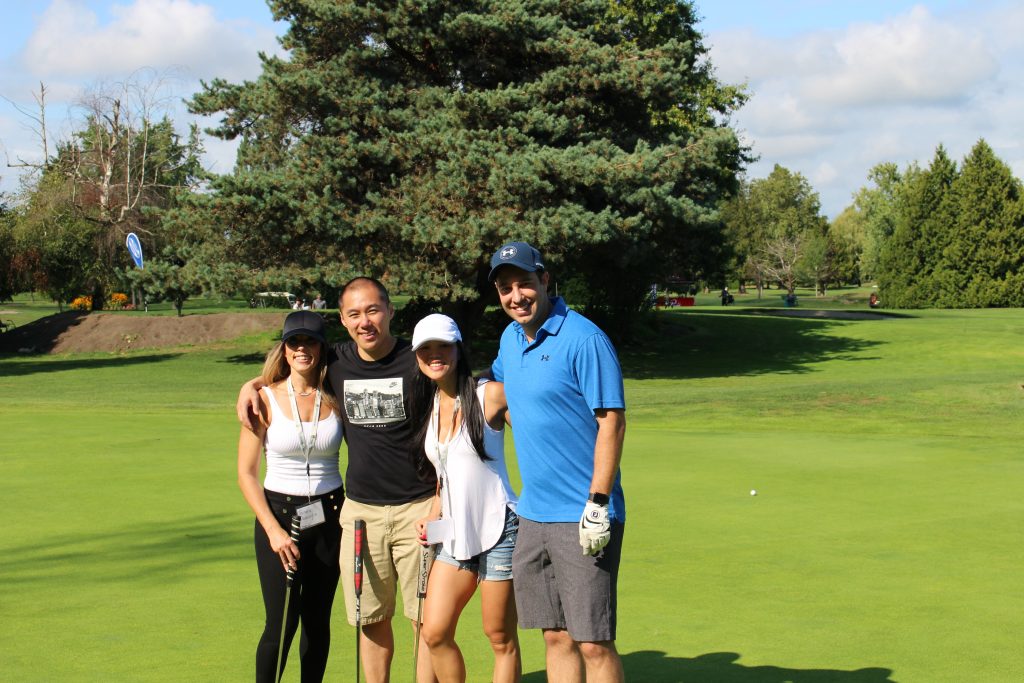 |
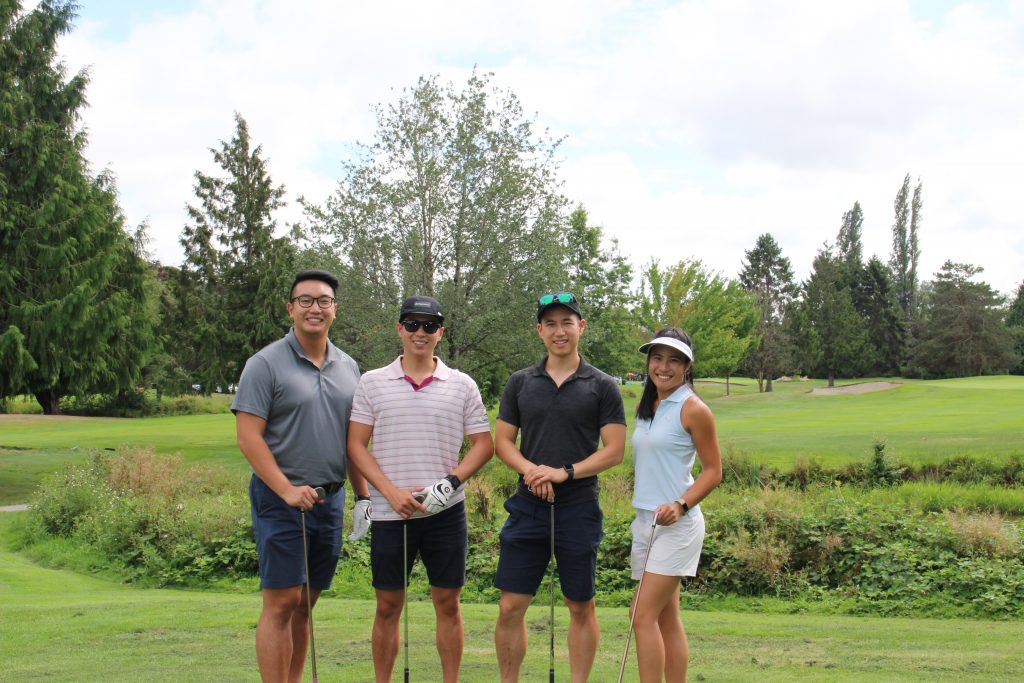 |
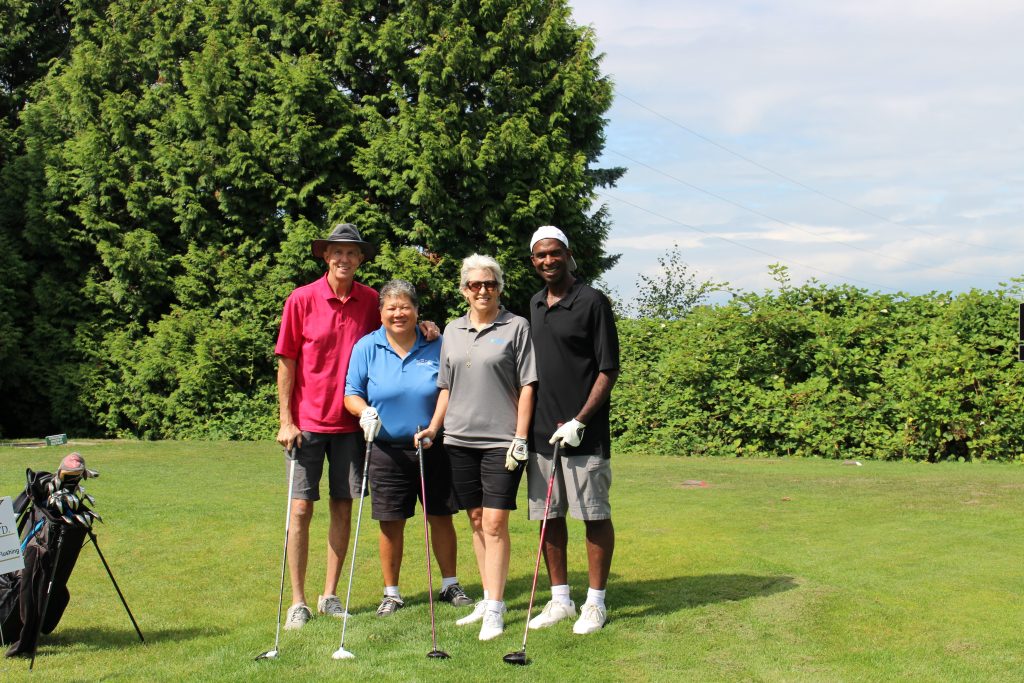 |
On Saturday, August 24, 2019, the UBC Physical Therapy Student Society hosted the UBC Physical Therapy Golf Open 2019 at the Mylora Executive Golf Course. Fortunately, the weather turned out to be a great day for golf, as 60 players participated in the tournament with the majority of participants being students and practicing therapists. One of the highlights of the event was the Marshmallow Drive on Hole 9, which required participants to swing and hit a marshmallow with the aim of achieving the longest drive. Congratulations to the Footbridge Physiotherapy team for winning the tournament this year! The tournament was a great event to develop meaningful connections between practicing physiotherapists and students, and we hope the golf tournament becomes an annual event in the future!
Thank you to all the sponsors, specifically CBI Health Group and the Physiotherapy Association of British Columbia, volunteers, and participants that made this event possible.
Click here for all the photos from the event!
Dr. Deborah Money (BSc’81, MD’85) receives lifetime achievement award for her contribution to improving women’s health
The award recognizes Dr. Money for her outstanding contributions to scientific exchange, education and leadership in infectious diseases in women.
Marshall Chasin MSc’81
Marshall Chasin, MSc’81, has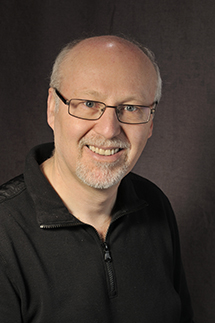 been a clinical and research audiologist for almost 40 years. He is the director of research and the chief audiologist for the Musicians’ Clinics of Canada.
been a clinical and research audiologist for almost 40 years. He is the director of research and the chief audiologist for the Musicians’ Clinics of Canada.
After completing a bachelor’s degree in mathematics and linguistics, Marshall was interested in a career in theoretical mathematics dealing with formal communication systems and algebras. He felt that he had three choices: teach high school mathematics, or enroll in graduate school in mathematics or linguistics. Marshall decided to enter graduate school in linguistics to study human communication. After several months studying at the University of Toronto, he wanted to move away from a purely theoretical approach to communication and communication breakdown. His graduate advisor suggested that he look into a career in Audiology.
At the time, UBC was one of three Canadian programs that offered a Master of Science degree in Audiology, now under the School of Audiology and Speech Sciences. In making his decision to move from Toronto to Vancouver, UBC’s location made an impact. “Being from Toronto I had never seen the mountains or the ocean before,” Marshall remarked. “While local BC inhabitants may take this for granted, it was quite novel for me.” When asked to look back on his time as a student at UBC, he recalls the excellent clinical facilities, an audiology program that was a good combination of theory and clinical work supported by a strong foundation of research, and meeting some of his closest friends during his time at UBC.
After working in a clinical and rehabilitative facility for several years, Marshall noticed a void in the field of audiology in how best to assess and provide solutions for those in the performing arts. In 1985, he helped found the Musician’s Clinics of Canada; the first clinic of its kind in North America to serve performing artists. One of Marshall’s primary areas of clinical interest and research is the preservation of hearing with musicians and those who like to listen to music. Marshall has published the first two textbooks on this topic and has been invited to speak at conferences around the world.
Currently, Marshall’s work involves clinical and research duties. In addition to seeing a full caseload of adults and children with hearing difficulties, his clinical research includes a focus on new hearing aid technologies that he helped develop in conjunction with the hearing aid industry.
Marshall credits his education at UBC with providing him with the bridge between the theory and the practical/clinical application. “Everything that I do clinically is based on the theoretical and clinical models, tools, and skills that I learned at UBC,” Marshall praised. “[UBC] taught me which buttons to push.” After ten years in the audiology profession, Marshall returned to school and obtained his Doctorate of Audiology in 2003.
Almost 40 years into the profession of audiology, Marshall notes that he continues to enjoy going to work every day. “One of the major reasons is that there is always something new to learn and new questions to ask,” Marshall says. “When I first graduated, the issues were “merely” technical, and like any technical/clinical field, I kept abreast of the progress. Today, the questions are much more complex, and some actually are aimed towards the long held assumptions that [audiologists] hold dear to our clinical hearts whenever we see new clients.”
When asked about the key to his success, Marshall remarked that tenacity is the most important quality. “If you have an idea, grab hold of it like a dog with a bone, and don’t let go,” he advised. “Like all fields, there are times when you will metaphorically be ‘knocked down.’ If you are knocked down ten times, then get up ten times.”
Ian MacDonald MD’79, PhD’89
Dr. Ian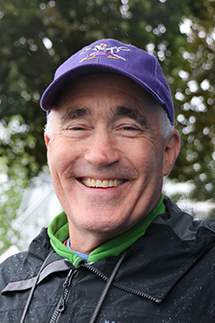 MacDonald, MD’79, PhD’89, who is currently the Faculty Lead, Curriculum Management Unit in the UBC Faculty of Medicine, is also a volunteer member of the Coquitlam Search and Rescue for the past 23 years.
MacDonald, MD’79, PhD’89, who is currently the Faculty Lead, Curriculum Management Unit in the UBC Faculty of Medicine, is also a volunteer member of the Coquitlam Search and Rescue for the past 23 years.
Describe what you do in a few sentences.
I work as the Faculty Lead of the Curriculum Management Unit in the UBC Faculty of Medicine (FOM). We are a small (3 people) unit within the Faculty of Medicine which keeps track of every educational session which takes place over years 1-4 of the undergraduate medical education program. We provide curricular data to several other units, and we ensure that every educational session is linked to, and is alignment with, course outcomes and FOM exit competencies.
What do you consider your greatest achievement to date?
Learning how to fly helicopters. Flying helicopters is very demanding and requires a lot of psychomotor skills which degrade with age, such as eye-hand coordination, multitasking, and visual processing. The Royal Air Force has a 100% failure rate for beginning helicopter pilots age 32 and above. I worked hard and was fortunate to earn my helicopter pilot’s license even though I was 35.
Please list a few of your current accolades/awards received, volunteer positions, and/or past job positions.
I have leveraged my MD degree in a variety of different ways, including general practice, emergency physician, critical care clinical assistant, occupational health physician, biomedical consultant, and biotech analyst for an investment firm.
The most important and satisfying volunteer work I’ve done has been as a member of Coquitlam Search and Rescue (SAR), an all-volunteer search & rescue team serving the northeast sector of the Lower Mainland. I’ve been a member for 23 years and participated in some amazing searches and rescues. Coquitlam SAR is a collection of highly skilled outdoors people who have a passion for helping those lost or injured in the wilderness, and I’m honoured to be able to contribute to such a professional organization.
Name the last book you couldn’t put down.
“A Beautiful Place to Die” by Malla Nunn. It is a crime mystery set in apartheid-era South Africa, a country which I’ve visited frequently, and Ms. Nunn is wonderfully evocative in describing the beautiful, sad reality of rural Natal as seen through the eyes of a mixed-race detective.
What is the best professional advice you’ve received?
Two UBC Georges taught me two of the most important things I learned in medical school: “Common sense isn’t so common.” (Dr. George Price), and “It takes 6 months to learn 80% of a subject and a lifetime to learn the other 20.” (Dr. George Gray).
What is your favourite UBC memory?
Wonderful, gooey UBC cinnamon buns; they were a special treat in those days as I didn’t have much money. I still love them.
Biggest risk you’ve taken to date?
Giving up practicing medicine for several years so I could pursue a career flying helicopters. I saw many wild things and met some wonderful people as a pilot, and in the process flew, literally, the length and breadth of Canada. I’ve fought forest fires, flown medevacs, landed on mountaintops; you name it!
What is your next challenge/goal?
I’m at a transitional point in my life and haven’t defined my next large challenge or goal quite yet.
What led you to choose your area of study for your MD?
I kind of drifted into general practice after completing my internship in Ottawa. I was not interested enough in any specialty to undertake residency training.
Did you almost study something else – or pursue a different path?
Yes, 4 years after graduation from med school I returned to UBC and began working on a PhD, in the Department of Microbiology. I enjoyed the lab-based research, and received my PhD, but opted to return to clinical medicine rather than pursue a research career.
What advice would you give to current Faculty of Medicine students?
I still tutor Year 1 & 2 Case Based Learning (CBL) groups and tell all my fretful students the same thing: just the fact that you’re sitting here in CBL means you’ve crossed the biggest hurdle to becoming a doctor, namely, getting into medical school. Put one foot in front of the other, stay on the path, do the work and you’ll do fine as a medical student; everyone wants to see you succeed, so if you’re having difficulties please reach out.
Please name a few of your favourite hobbies and activities.
I love reading, travelling, hiking, skiing. I don’t get enough time for them all!
Name something that is on your bucket list. Have you completed it?
I’m a James Bond fan and plan to attend the opening of James Bond 25 in London next spring. What could be more fitting than watching James Bond in London?
What are the best aspects of your career?
Knowing that I’m helping to maintain and improve one of the best undergraduate medical education programs in the world. Also, I love to write and this job gives me lots of opportunity to do so.